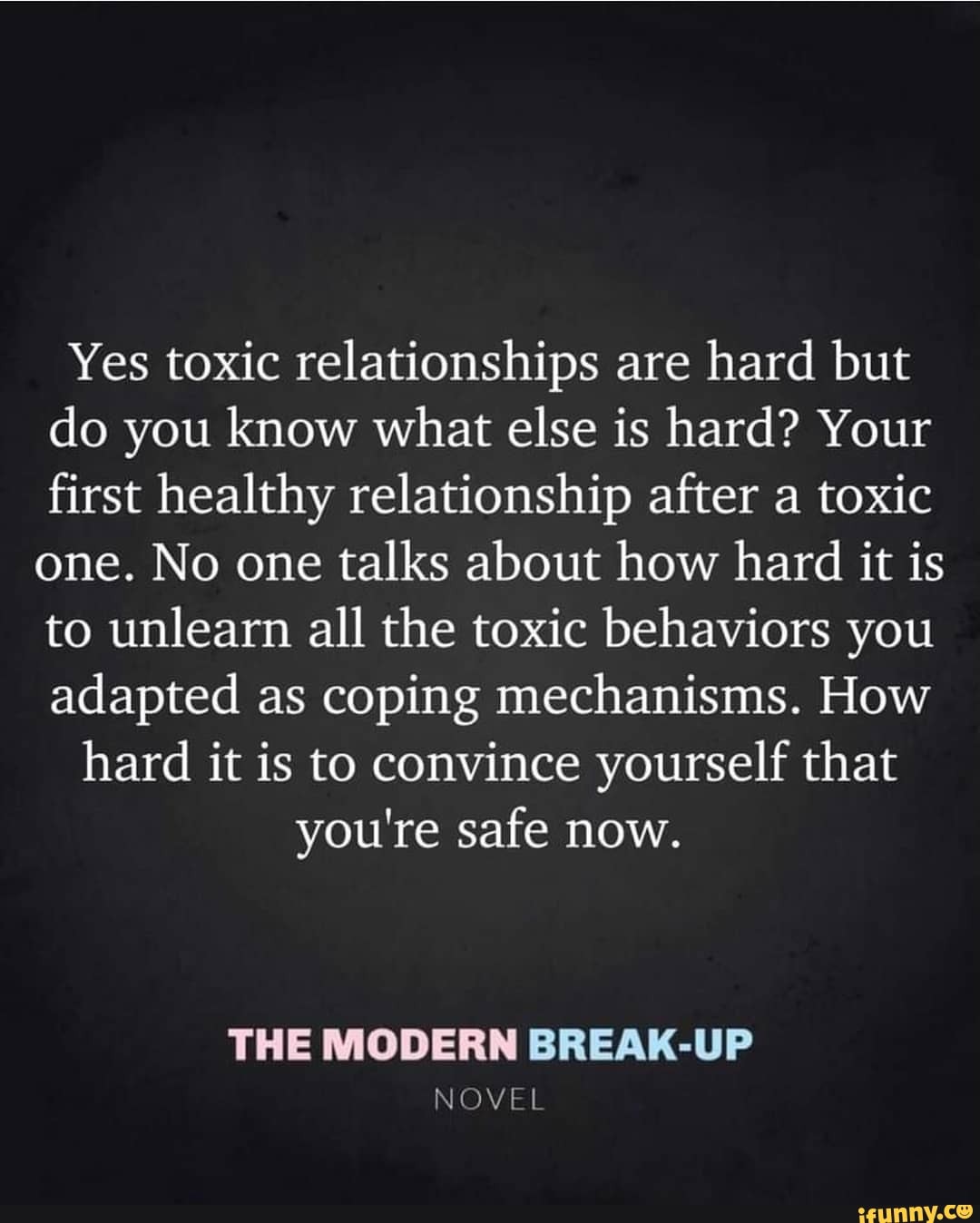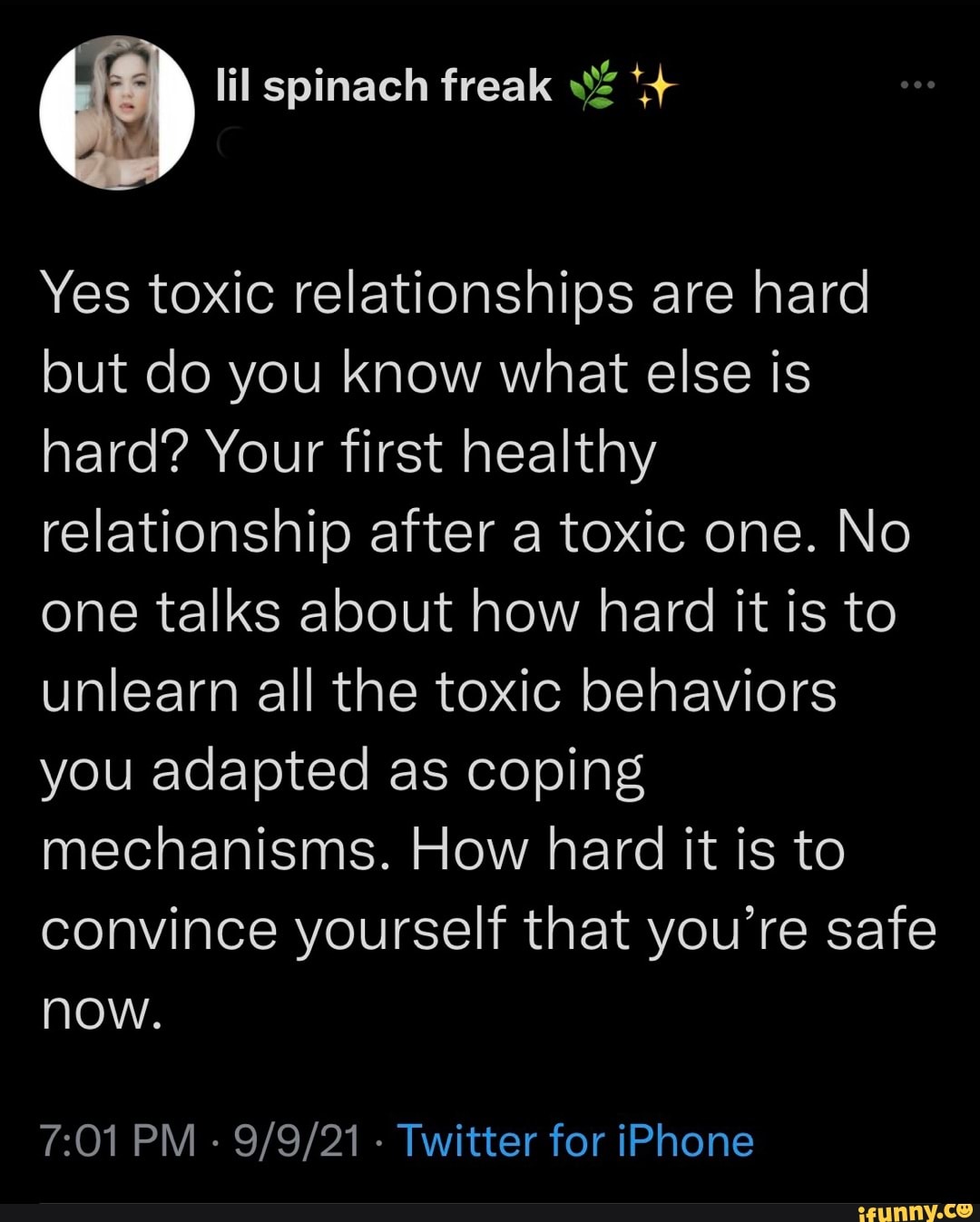To have a healthy relationship after a toxic one, focus on self-healing and setting clear boundaries. A toxic relationship can leave lasting scars, making it challenging to trust or open up to someone new.
However, it is possible to break free from the cycle and cultivate a healthy, loving partnership. By prioritizing self-healing and establishing clear boundaries, individuals can create a foundation for a newfound connection built on trust and mutual respect. We will explore practical steps for moving forward after a toxic relationship, empowering individuals to embrace happiness and cultivate a healthier and more fulfilling love life.
Let’s delve into these strategies that offer hope and guidance on the path to a healthier future.
Recognizing The Signs Of A Toxic Relationship
Recognize the signs of a toxic relationship and learn how to have a healthy one afterward. Discover the key elements to move on and build a positive and fulfilling partnership.
Emotional Manipulation
Recognizing the signs of a toxic relationship is the crucial first step toward breaking free and starting anew. One of the most common signs is emotional manipulation. In a healthy relationship, both partners should feel equal and respected. However, in a toxic relationship, one partner often uses emotional manipulation as a way to control the other. This can manifest in various ways, such as guilt-tripping, gaslighting, or constant mood swings that keep the victim off balance. It’s important to recognize these behaviors and understand that they are not acceptable in a healthy relationship.
Lack Of Trust
Another sign of a toxic relationship is a lack of trust. Trust is the foundation of any healthy partnership, and when it is absent, the relationship becomes unstable. Constant suspicion, questioning, and accusations can be indicative of a toxic dynamic. In a healthy relationship, both partners should feel secure and confident in each other’s loyalty and fidelity. If trust is repeatedly broken and not rebuilt, it can be a sign that the relationship is toxic and unhealthy. It’s important to address these trust issues early on and seek professional help if necessary.
Constant Criticism
In a healthy relationship, partners support and encourage each other’s growth. However, in a toxic relationship, constant criticism becomes the norm. This can take the form of belittling remarks, nitpicking, or a never-ending stream of negativity. Over time, constant criticism can erode self-esteem and self-worth, leaving the victim feeling trapped and inadequate. Recognizing this pattern is essential to breaking free from a toxic relationship and establishing a healthier dynamic where both partners lift each other instead of tearing each other down.
Isolation
Isolation is another sign of a toxic relationship. In a healthy partnership, both partners have their own lives and interests, as well as a shared life together. However, in a toxic relationship, one partner may try to isolate the other from friends, family, and outside support systems. This isolation makes the victim more vulnerable and dependent on the toxic partner. It’s crucial to recognize these attempts at isolation and reach out to trusted friends or professionals who can provide support and guidance in breaking free from toxic relationships.
In conclusion, recognizing the signs of a toxic relationship is the first step toward building a healthier and happier future. By understanding and acknowledging emotional manipulation, a lack of trust, constant criticism, and isolation, individuals can take the necessary steps to break free and pave the way for a healthy and fulfilling relationship. Don’t hesitate to seek professional help and surround yourself with a strong support system as you embark on this journey of healing and growth.

Credit: br.ifunny.co
Healing And Moving On
After enduring a toxic relationship, it is crucial to prioritize the healing process and begin the journey toward building a healthy and fulfilling connection. Healing and moving on from the harmful effects of a toxic relationship can be challenging, but with the right strategies, it is possible to reclaim your happiness and create healthier relationships moving forward. This article will explore the essential steps to take to heal and move on from a toxic relationship.
End The Toxic Relationship
To begin the healing process, it is imperative to end the toxic relationship. This may involve setting clear boundaries and making the difficult decision to walk away from the toxic person. Recognize that you deserve a positive and respectful partnership and that staying in a toxic relationship will only hinder your personal growth.
Seek Professional Help
Seeking professional help is an important step towards healing and moving on. Consider reaching out to a therapist or counselor who specializes in relationships and trauma. A skilled professional can provide guidance, support, and valuable tools to help you process your emotions and recover from the toxic relationship. They can help you understand your patterns and behaviors, enabling you to create healthier relationship dynamics in the future.
Practice Self-care
Engaging in self-care activities is crucial for healing and rebuilding after a toxic relationship. Prioritize your physical, emotional, and mental well-being. Make time for activities that bring you joy and help you reconnect with yourself. This can include exercise, meditation, journaling, pursuing hobbies or interests, and spending time with loved ones who uplift you. Taking care of yourself will help restore your self-esteem and establish a strong foundation for future healthy relationships.
Establish Boundaries
Establishing boundaries is essential to protect yourself and prevent toxic behavior from infiltrating your life. Communicate your expectations and limits to others, ensuring that your needs are respected. Learn to identify red flags and embrace your ability to prioritize your well-being. Setting and maintaining healthy boundaries will safeguard your emotional health as you move forward into healthier relationship dynamics.
Surround Yourself With Supportive People
Surrounding yourself with supportive and positive individuals is crucial during the healing process. Seek out friends, family, or support groups who understand your experiences and can provide a nurturing environment. These individuals will offer empathy and validation as you work towards healing and establishing healthy relationship patterns. Building a support network will provide the encouragement and strength needed to navigate the challenges of moving on from a toxic relationship.
Building A Healthy Foundation
After enduring a toxic relationship, it’s essential to rebuild your foundation and create a healthy environment for future relationships. Building a strong foundation requires reflection, effective communication, trust, transparency, and encouraging independence. By implementing these strategies, you can ensure your relationship evolves into a healthy and fulfilling one.
Reflect On Past Patterns
To move forward, it’s crucial to take a moment and reflect on your past patterns and behaviors. Understand the dynamics that contributed to the toxicity, whether it was excessive criticism, lack of boundaries, or an imbalance of power. By recognizing these patterns, you can actively work towards making positive changes and avoiding the same mistakes in future relationships. It’s an opportunity for self-growth and a chance to break free from the toxic cycle.
Develop Strong Communication Skills
Communication is the cornerstone of any healthy relationship. It involves active listening, respectfully expressing your feelings, and valuing your partner’s perspective. Open and honest conversations foster understanding, build trust, and promote emotional intimacy.
To enhance your communication skills, practice empathy, and strive for clarity. Use “I” statements to express your needs and emotions without blaming or criticizing your partner. Encourage open dialogue by creating a safe space where both individuals feel heard and respected.
Build Trust And Transparency
Trust is the foundation of a healthy relationship. Rebuilding trust after a toxic relationship may take time and effort, but it’s worth it. Be consistent, and reliable, and follow through on your commitments. Show your partner that they can depend on you and that you trust them as well.
Transparency is equally important. Share your thoughts, feelings, and concerns openly with your partner. Avoid secrets and dishonesty, as they erode trust. Foster an environment where both individuals feel secure and comfortable being vulnerable with each other.
Encourage Independence
In a healthy relationship, it’s vital to recognize and respect each other’s independence. Encouraging individuality allows both partners to grow, pursue personal interests, and maintain a sense of self. It’s important to strike a balance between togetherness and independence.
Support your partner’s ambitions and personal growth. Encourage them to engage in activities they enjoy, spend time with friends and family, and pursue their passions. Celebrate each other’s individuality and create a relationship that enhances personal growth and fulfillment.
Maintain Individual Identities
In a toxic relationship, individual identities often get lost. It’s essential to maintain a sense of self even when in a committed partnership. Nurture your interests, hobbies, and goals. Remember that your identity extends beyond your relationship.
By maintaining individual identities, you bring unique experiences and perspectives to the relationship. It keeps the relationship dynamic and prevents codependency. Embrace your own identity, find joy in your passions, and share those experiences with your partner.

Credit: br.ifunny.co
Nurturing The Relationship
After experiencing a toxic relationship, it’s essential to focus on nurturing the new healthy relationship that you have found. This involves actively taking steps to strengthen your bond, improve communication, and create a supportive and loving environment for both partners. Here are some key ways to nurture your relationship:
Practice Active Listening
Listening is a crucial aspect of any healthy relationship. When you practice active listening, you make a conscious effort to fully understand your partner’s thoughts, feelings, and needs. Give your partner your undivided attention, maintain eye contact, and try to empathize with their perspective. Avoid interrupting or jumping to conclusions, and instead, focus on truly hearing and understanding what they have to say.
Support Each Other’s Dreams And Goals
Building a healthy relationship means supporting each other’s dreams and goals. Encourage your partner to pursue their passions and aspirations, even if they may differ from your own. Be their biggest cheerleader, providing the emotional support and motivation they need to achieve success. By nurturing each other’s dreams, you are fostering a strong sense of partnership and creating a solid foundation for a healthy relationship.
Show Appreciation And Gratitude
Expressing appreciation and gratitude for your partner is a simple yet powerful way to nurture your relationship. Take the time to acknowledge and thank your partner for the things they do, whether big or small. Showing gratitude can help create a positive and loving atmosphere, where both partners feel valued and appreciated. Regularly remind each other of the reasons why you are grateful to have one another and watch your love and connection grow.
Resolve Conflicts In A Healthy Way
In any relationship, conflicts are inevitable, but how you handle them can make all the difference. Instead of resorting to toxic patterns of communication, strive to resolve conflicts in a healthy, respectful manner. Practice effective problem-solving skills, such as active listening, compromise, and finding solutions that work for both partners. By addressing and resolving conflicts healthily, you are nurturing trust, understanding, and emotional safety in your relationship.
Prioritize Quality Time Together
One of the most effective ways to nurture your relationship is by prioritizing quality time together. Set aside dedicated time for just the two of you to bond, connect, and engage in activities that you both enjoy. This could be anything from going for a walk together, cooking a meal, or simply sitting and talking. By making time for each other, you are reaffirming the importance of your relationship and creating lasting memories.
Continued Growth And Maintenance
Continued Growth and Maintenance are essential for having a healthy relationship after a toxic one. It’s important to remember that healing from a toxic relationship is an ongoing process, and both partners need to actively work on their relationship to ensure it stays healthy and thriving. Here are some key practices that can help in achieving continued growth and maintenance:
Regularly Check In
Regularly checking in with each other is crucial for maintaining a healthy relationship. Take the time to have open and honest conversations about how you both are feeling and what you need from each other. This allows you to address any potential issues or concerns before they escalate, fostering a sense of trust and understanding. Set aside dedicated time to check in with each other, whether it’s over a cup of coffee or during a relaxing walk in the park.
Attend Relationship Workshops Or Counseling
Attending relationship workshops or seeking counseling can be tremendously helpful for growth and maintenance. These resources provide a safe space for both partners to explore any lingering effects of the toxic relationship and learn healthy communication skills. Through workshops or counseling, you can gain valuable insights, acquire effective tools, and gain a better understanding of how to nurture your relationship and avoid falling back into old patterns.
Celebrate Milestones And Achievements
Celebrating milestones and achievements is a beautiful way to acknowledge the progress made in your relationship. Whether it’s a small accomplishment or a major milestone, take the time to celebrate together. This fosters a positive and supportive atmosphere, reinforcing the belief that both partners are capable of growth and can overcome challenges. It also allows you to reflect on the transformation of your relationship and appreciate the journey you have embarked on together.
Adapt And Evolve Together
A healthy relationship requires adaptability and the willingness to evolve together. Recognize that both you and your partner will continue to grow as individuals, and your dynamics as a couple may need to adapt. Embrace change and communicate openly about your evolving needs and desires, ensuring that both partners feel heard and respected. By navigating life’s twists and turns together, you can cultivate a relationship that is resilient and capable of withstanding future challenges.
Keep The Romance Alive
Making an effort to keep the romance alive is an important aspect of maintaining a healthy relationship. Plan special date nights, surprise each other with thoughtful gestures, and take time to express your love and affection. Keeping the romance alive helps to create a strong emotional connection and prevent complacency within the relationship. It reminds both partners of the love they share and strengthens the bond between them.
Frequently Asked Questions Of How To Have A Healthy Relationship After A Toxic One
How Can I Have A Healthy Relationship After A Toxic One?
Having a healthy relationship after a toxic one requires self-reflection, open communication, and setting boundaries. Take time to heal, seek therapy if needed, and learn from past mistakes. Be honest with your new partner, establish trust, and prioritize your own happiness and well-being.
What Are The Signs Of A Toxic Relationship?
Signs of a toxic relationship include lack of trust, constant criticizing and belittling, controlling and manipulative behavior, gaslighting, and emotional or physical abuse. If you feel constantly drained, anxious, or unhappy in the relationship, it may be a toxic one.
How Can I Rebuild Trust After A Toxic Relationship?
Rebuilding trust after a toxic relationship takes time and effort from both partners. The key is open and honest communication, consistent actions that demonstrate trustworthiness, and practicing forgiveness. Seeking couples therapy or individual counseling can also help in the healing process.
Conclusion
Breaking free from a toxic relationship is no small feat, but once you’ve done it, it’s essential to focus on healing and creating a healthy, fulfilling partnership. By prioritizing self-care, setting boundaries, and practicing effective communication, you can cultivate a loving connection built on trust, respect, and support.
Remember, it takes time and effort, but you deserve a relationship that nourishes your soul.










